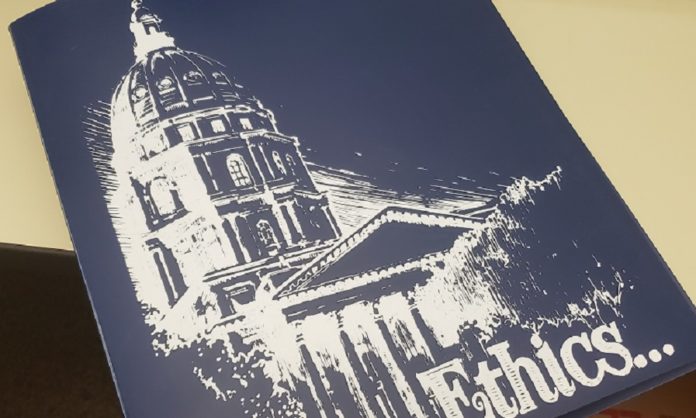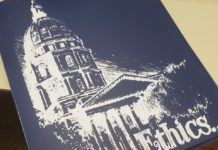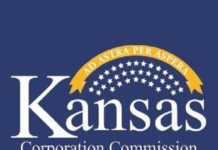A complaint was filed with the Kansas attorney general Thursday, alleging that the state ethics commission violated the open meetings law when it planned how to respond to an effort in the Senate last year to oust its executive director.
Two attorneys who have represented clients that have been the focus of ethics commission investigations say in their complaint that the commission skirted the open meetings law by participating in serial email communications.
They provided the attorney general with emails from April 1, 2022, when a Senate conference committee took up a proposal that would have required the executive director to be a licensed attorney in good standing for three years.
The proposal, which was later scrapped, would have forced out Mark Skoglund, whose law license had been suspended in 2015 after he chose not to maintain the license because he wasn’t using it and it was expensive to maintain. He has since reinstated his law license.
The complaint, brought by attorneys Ryan Kriegshauser and Josh Ney, says Skoglund and the ethics commission used serial emails to discuss how to respond to the Senate’s action without holding an open meeting.
The discussions eventually produced a letter from the ethics commission defending Skoglund in response to the Senate’s action that day, hours after the conference committee first took up the issue in the morning.
The complaint includes an exhibit “showing that a number of commissioners approved the letter in the serial communication and the letter is ultimately sent out purporting unanimous approval.”
Skoglund did respond to an email and a voice mail seeking comment.
The complaint says the “environment within the Kansas Governmental Ethics Commission is concerning.”
“The culture of the Kansas Governmental Ethics Commission as it relates to openness and transparency is seriously in question.”
It emphasizes an email from Commissioner Kyle Krull, who proposed having an “unofficial” meeting of the commission with full staff at an offsite venue.
He suggested holding the meeting at Boulevard Brewing Co., where the commission’s chair, Nick Hale, is general counsel.
Krull, first appointed to the commission in 2011 by then-Secretary of State Kris Kobach, said the commission should register as lobbyists and invite senators to discuss the issue socially.
He suggested using the agency’s fee fund to pay for the meeting.
At one point in the email chain, the lawyer for the ethics commission cautioned against Krull’s proposal.
“It’s okay for commissioners to talk among themselves outside of a meeting so long as it’s not about commission business,” Brett Berry wrote.
The topic, he said, may be about “various species of hardwood, but people will assume or accuse the worst.”
Ney called the ethics commission’s conduct “business as usual for a rogue agency unable to follow their own rules and the same basic rules every other agency in state government follows.”
“I’d say you can’t make this stuff up–but the commission is clearly doing their best to make up the law as they go along, at least as it applies to everybody except themselves,” he said in an email.
The complaint seeks to not only void the action, but wants the attorney general to investigate the agency further for additional serial communications.
It also wants the commissioners and staff trained in open-meetings law. A violation of the law carries a fine of up to $500 per violation per member.
The ethics commission has been under increasing scrutiny in the last years after launching a wide-ranging investigation that’s been focused on the Republican Party.
Skoglund has said the agency was investigating whether campaign finance laws were violated when political action committees allegedly gave money to Republican county parties that was in turn relayed to the state Republican Party.
First publicly disclosed last spring, the investigation led to subpoenas being issued to many Republican Party leaders, consultants, lawmakers and affiliated political action committees.
The investigation prompted suggestions at the Capitol that the commission is overstepping its bounds with overly broad requests for information related to its probe.
The future of the agency’s direction is in question, with Republican legislative leaders recently appointing two new members to the commission and the House minority leader appointing a member of his staff to the commission.
The Legislature is now considering a broad proposal that would limit its investigative authority, including restricting its power to subpoena witnesses.















